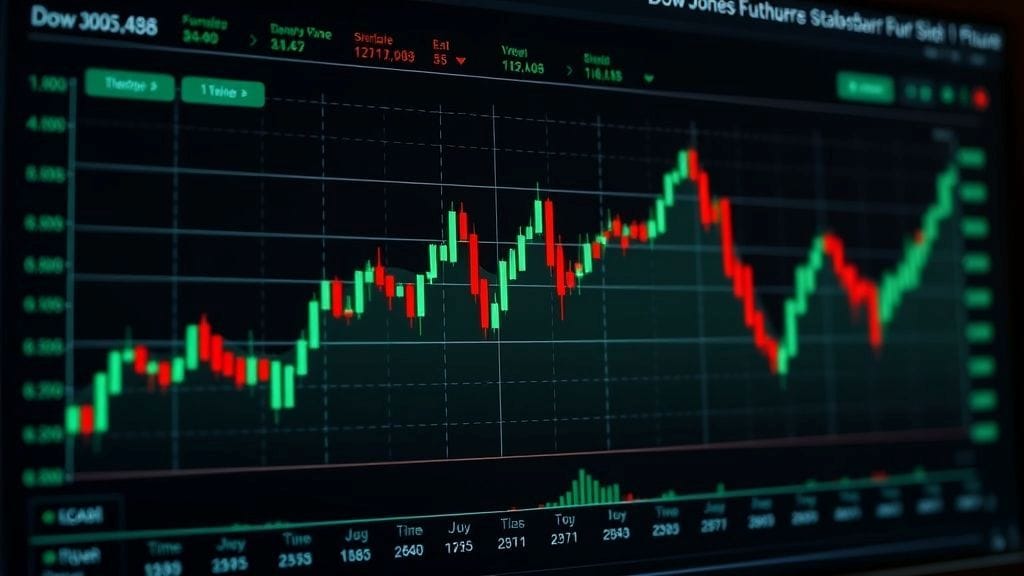The world of financial trading can seem overwhelming, especially when it comes to complex instruments like futures. But don’t worry! If you’ve ever heard the term “Dow Jones Futures” and wondered what it’s all about, you’re in the right place.
This beginner-friendly guide will explain what Dow Jones Futures are, how they work, and why they play such an important role in financial markets. By the end of this article, you’ll have a solid understanding of Dow Futures, making it easier for you to dive into the world of futures trading.
In this first part of the series, we’ll break down the basic concepts and provide you with all the foundational knowledge you need to get started with Dow Futures. Let’s start with the basics!

Part 1: Introduction to Dow Jones Futures + Basic Concepts
Understanding Dow Jones Futures can seem complicated at first, but it’s easier than you might think. In this section, we’ll break down the basics so you can grasp what they are, how they work, and why they matter—even if you’re completely new to the stock market.
What Are Dow Jones Futures?
At its core, Dow Jones Futures are a type of financial contract that allows traders to buy or sell the future value of the Dow Jones Industrial Average (DJIA), one of the most well-known stock market indexes globally. The DJIA tracks the performance of 30 major companies in the United States, representing key sectors of the economy.
Futures contracts are agreements to buy or sell an asset at a predetermined price on a specific date in the future. When you trade Dow Jones Futures, you’re essentially making a bet on whether the value of the Dow Jones will go up or down by the time the contract expires.
For example, if you believe that the Dow will rise shortly, you would buy Dow Jones Futures. If you think the Dow will fall, you would sell Dow Jones Futures. This flexibility allows traders to make profits whether markets are rising or falling, making Dow Futures a powerful tool in the hands of investors.
Why Do Dow Jones Futures Matter?
Understanding Dow Jones Futures is crucial because they provide insight into market sentiment and help traders manage risk. Here’s why they matter:
- Market Sentiment: Dow Futures give traders an early indication of how the stock market might perform once it opens for the day. If Dow Futures are trading higher, it might suggest a positive day ahead for the stock market. Conversely, if they’re down, it could indicate a rough opening.
- Risk Management: Investors and traders use Dow Futures to hedge against potential losses in other areas of their portfolio. For example, if a trader expects the stock market to decline, they might use Dow Futures to protect themselves by taking a short position.
- Global Impact: Dow Jones Futures don’t just affect U.S. markets—they can influence global markets as well. Since the DJIA includes major multinational companies, movements in Dow Futures can ripple through stock markets worldwide. This global reach makes understanding Dow Futures even more important for investors worldwide.
How Do Dow Jones Futures Work?
Dow Jones Futures work by giving traders the ability to buy or sell contracts based on the performance of the DJIA. When you enter a Dow Jones Futures contract, you’re agreeing to buy or sell the index at a specific price on a future date. Here’s how they function:
- Contract Size: Each Dow Jones Futures contract represents $5 times the value of the DJIA. So, if the DJIA is at 35,000 points, one contract would be worth $175,000. This gives you exposure to a large portion of the stock market with a single contract.
- Leverage: Futures contracts allow you to use leverage, which means you can control a large contract value with a relatively small amount of capital. Although this can boost your chances of making more money, it also raises the chances of losing more. Leverage is a double-edged sword—so it’s important to be aware of the risks involved when trading Dow Jones Futures.
- Expiration Date: Dow Jones Futures contracts have an expiration date, typically on the third Friday of each month. At expiration, the contract is settled based on the final value of the DJIA. This timing is critical for traders looking to make quick moves based on short-term predictions.
- Trading Hours: Dow Jones Futures are traded nearly 24 hours a day, five days a week. This allows traders to respond to market news and events at any time of the day or night. Whether you’re in the U.S. or another country, Dow Futures can be traded at almost any time, making them accessible to a global audience.
Want to Dive Deeper?
If you’re eager to explore more about Dow Jones Futures, here are two excellent resources to check out:
Understanding DJIA Futures: A Comprehensive Beginner’s Guide
Watch: Dow Jones Futures Explained – How to Trade The DJIA?
Why Should You Care About Dow Jones Futures?
As a trader, investor, or anyone interested in the financial markets, understanding Dow Jones Futures can be beneficial for several reasons:
- Predict Market Movements: By following Dow Futures, you can get an early indication of how the stock market will open. This can help you make better trading decisions, particularly if you want to take action before the market officially opens.
- Opportunities for Profit: If you believe the Dow Jones will rise, you can buy Dow Futures contracts. If you think it will fall, you can sell them. This flexibility creates opportunities in both rising and falling markets, offering traders a chance to profit in any environment.
- Hedge Against Market Risk: Dow Futures can be used to hedge your stock portfolio against potential losses. For example, if you’re concerned about a market downturn, you can short Dow Futures to offset losses in your long positions. It’s a useful tool for managing risk during uncertain market conditions.
Curious about how retail-driven stocks behave in the market? Check out our blog on GameStop Corp. (GME): Resilience and Growth in the Evolving Gaming Market to see how one company captured headlines and investors’ attention.
Summary
In this first part of our series, we’ve covered the basics of Dow Jones Futures—what they are, why they matter, and how they work. Dow Jones Futures are an essential tool for traders, offering ways to profit from market movements or hedge against potential losses. In the next part of this series, we’ll dive deeper into how to get started with Dow Futures and the key terms every trader should know.
Call to Action (CTA)
Are you ready to dive into the world of Dow Futures? In Part 2, we’ll show you how to get started with Dow Futures trading, from choosing a broker to understanding important terms. Stay tuned and keep learning!


Leave a Reply